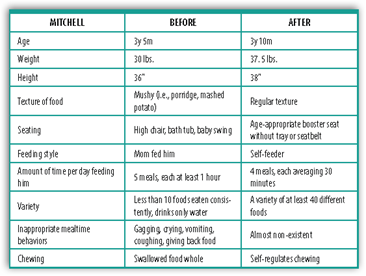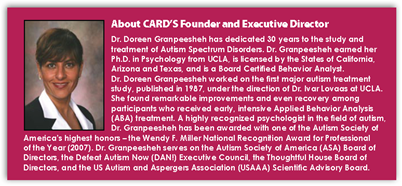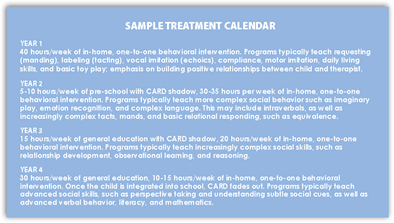The Center for Autism and Related Disorders released results from three-year study that recovery from autism is possible. The study involved 14 children and used  behavioral modification and 43 percent no long displayed symptoms of autism so this is not a 100% cure but a little less than half is certainly well worth the effort. Some might say the study was a small group, but any improvement for Autism is worth talking about for sure. Those who were not declared without symptoms showed improvement as well.
behavioral modification and 43 percent no long displayed symptoms of autism so this is not a 100% cure but a little less than half is certainly well worth the effort. Some might say the study was a small group, but any improvement for Autism is worth talking about for sure. Those who were not declared without symptoms showed improvement as well.
This was a joint effort in which the State of Arizona funded and CARD has several locations in the US and around the world, which you can find at the website and listed at the bottom of the press release. BD
Press Release:
Phoenix (November 12, 2010) – A landmark study proves that children are capable of recovery from autism, or of making substantial gains in cognitive and adaptive functioning, as well as language skills, according to results released last night by Dr. Doreen Granpeesheh, founder of the Center for Autism and Related Disorders, Inc. (CARD).
The three-year study, which the State of Arizona funded and CARD, the world’s largest provider of early intensive behavioral intervention for children with autism, conducted, evaluated the effects of behavioral intervention for 14 young children with autism using a version of Applied Behavior Analysis (ABA) that blends structured teaching with play-based behavioral intervention. Today, 43 percent of the study’s participants no longer display clinical symptoms of autism and most of the participants demonstrate significant improvements in functioning. 
In accordance with previous research, CARD found that many of the children made substantial gains in cognitive and adaptive functioning, as well as language skills. Most of the children also demonstrated significant improvements in executive functioning. After treatment, the average T-score for the group on the BRIEF, a measure of overall executive functioning, was 61, well below the cut-off for clinically significant impairment. Parent stress was also decreased dramatically, with a mean post-treatment percentile score of 68, also well below the cut-off for clinical significance. In addition, 8 out of 14 children were functioning in the average range on the Vineland ABC, a measure of overall adaptive functioning, whereas only 2 of 14 were in the average range before treatment began.
“Years ago, some doctors would tell parents that they should institutionalize their children after an autism diagnosis,” said Dr. Granpeesheh. “Today, we know that autism is treatable and recovery is possible with the right services. Every child deserves a chance to learn and grow, and we hope that these results provide hope to families of newly diagnosed children.
“My daughter is now recovered from autism,” said Elizabeth Howell, parent of a study participant. “When people meet her and interact with her, they cannot believe that she ever had an autism diagnosis. My daughter is an outstanding student in an elementary classroom with typical peers without any aides or support. Our family now does things that we previously only dreamed of doing – we are like every other family on the block.”
Among the study’s major findings is that children who developed language skills early in therapy made greater gains over time. In addition to the children who recovered from autism, the other half of the program participants made substantial gains in their ability to communicate and live independently. Even the children whose progress was the slowest experienced significant decreases in challenging behaviors and increases in independent communication and leisure skills, thereby resulting in improved self-reliance and quality of life. 
“The behavioral intervention was intensive, comprehensive and high-quality,” said Dr. Amy Kenzer, CARD research manager. “These factors play a major role in the outcomes observed.”
“This project provides further proof that autism is treatable and that behavioral intervention is effective, when done properly,” says Dr. Jonathan Tarbox, CARD director of research and development.
What makes this study unique is the successful partnership between the state of Arizona, CARD (a private agency), and families affected by autism.
In 2007, the state of Arizona allocated funds for a three-year program that evaluated the effects of behavioral intervention for 14 young children with autism. All children received 25 or more hours per week of one-on-one teaching and therapy with trained professionals. Their therapy consisted of intensive teaching based on the principles and procedures of Applied Behavior Analysis (ABA), a scientifically proven treatment for autism. The CARD Model of ABA, which focuses on blending intensive, structured teaching with less structured, play-based behavioral intervention techniques, was implemented in the study. Treatment plans were based on identifying what motivates the children and treatment activities were based on the desires and interests of children involved. As part of the study, the CARD treatment integrated a careful assessment of each child’s strengths and deficits and directly addressed each area of need through targeted teaching programs.
“I have followed the progress of these children over the past three years and the results are spectacular,” said Russell Pearce, president-elect of the Arizona State Senate.
The program is now a model for the implementation of effective, comprehensive, intensive behavioral intervention for children with autism.
“We want to particularly thank the incredible families we worked with,” said Dr. Granpeesheh. “One of the most important factors that impact the effectiveness of treatment is the involvement and dedication of a child’s parents, and we could not ask for better parents than we have the privilege of working with in Arizona.”
Autism is a pervasive developmental disorder that is marked by the presence of impaired social interaction and communication and a restricted repertoire of activities and interests. Autism is currently estimated to affect as many as 1 in 110 children in America and is four times more common in boys than in girls.
For questions regarding this study, contact Dr. Jonathan Tarbox at j.tarbox@centerforautism.com.
For more information about the CARD curriculum, visit: www.centerforautism.com and www.skillsglobal.com or www.skillselearning.com.
About the Center for Autism and Related Disorders, Inc.:
The Center for Autism and Related Disorders, Inc. (CARD) is the world's largest and most experienced organizations effectively treating children with autism and related disorders. Following the principles of Applied Behavior Analysis, a behavioral treatment approach that has been thoroughly and empirically validated by the scientific community, CARD develops individualized treatment plans that focus on teaching vital skills.
CARD’s extensive curriculum consists of programs to teach language and communication, social skills, self-help skills, fine and gross motor skills, play skills, social cognitive skills and executive functioning skills. Programming in each of these areas follows a hierarchical advancement that utilizes combinations of errorless teaching, discrete trial training, fluency and natural environment training. The CARD program supports biomedical interventions for autism and promotes the use of these interventions to stabilize the child’s medical condition prior to and during behavioral intervention. CARD is committed to science as the most objective and reliable approach to evaluating treatment for autism. CARD’s mission is to conduct empirical research on the assessment and treatment of autism and to disseminate research findings and derived technology through publication and education of professionals and the public. While the primary focus of CARD’s research is ABA-based methods of assessment and treatment, CARD’s overall approach to research includes any topic which may hold promise for producing information that could improve the lives of individuals with autism.
CARD provides both regional and remote services around the globe through its 20 satellite sites in Arizona, Australia, California (12), Illinois, New York (2), New Zealand, Texas, Virginia, and its affiliate sites in the United Arab Emirates and South Africa. With a mission to increase access to the most effective treatments, CARD has developed strong working relationships with parent organizations, schools, government agencies all over the world and across six continents. CARD was founded by Executive Director Doreen Granpeesheh, PhD, BCBA-D, in 1990.
For more information about the Center for Autism and Related Disorders, visit: www.centerforautism.com.






Why is the study not accessible?? You would think that since the State of AZ paid $5.4 MM for the study that it would be peer reviewed and posted for the public to read.
ReplyDeleteNothing would make me happier than to find a "cure" for Autism. However, the public needs to be VERY wary of a study done by a private company whose sole interest is in promoting one specific methodology. The public should also know that almost all kids with Autism improve significantly over a 3 year period via many methods - not just ABA. Let's not forget that it took over a decade to debunk the vaccine myth which was the result of a study done by - you guessed it - a private entity who profited from the promotion of a non-mercury containing vaccine. ABA is one of many terrific intervention techniques. It does not "cure" and parents/school districts should NOT jump on an ABA bandwagon just yet. Shame on the news for touting a "Cure". This is a disservice to families everywhere.
I try to represent all information on autism that I can and was sure to focus on the first autistic appointee by the White House too. I agree that some of this get distorted as it does with other areas of healthcare too.
ReplyDeletehttp://ducknetweb.blogspot.com/2010/10/first-autistic-presidential-appointee.html
There's also another group I have posted about recently offering help and assistance.
http://ducknetweb.blogspot.com/2010/07/wellspring-opens-corporate-headquarters.html
I try to cover angles where I hope there's useful information and perhaps we will hear more on the Arizona study too.
The AZ study simply replicates what has already been shown in peer reviewed journals... nothing really new here.
ReplyDeleteHowever, even though ABA doesn't work for every child, on average, it is THE BEST treatment available for ASDs, period. Hence, parents would be remiss if they didn't at least start there....
The problem is, however, if ABA isn't covered by you insurance, then the cost is prohibitive for most (40 hours per week)x(52 weeks) x ($50/hr.) = $104,000 per year.
And even with all of the new legislation concerning coverage for ASDs, most aren't covered.... ours child isn't.
That God we don't have socialized medicine so that my child would have a reasonable shot at a normal life.